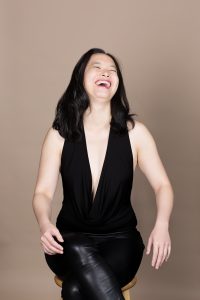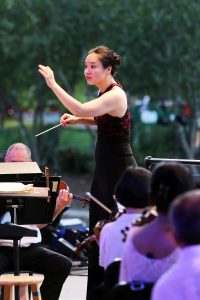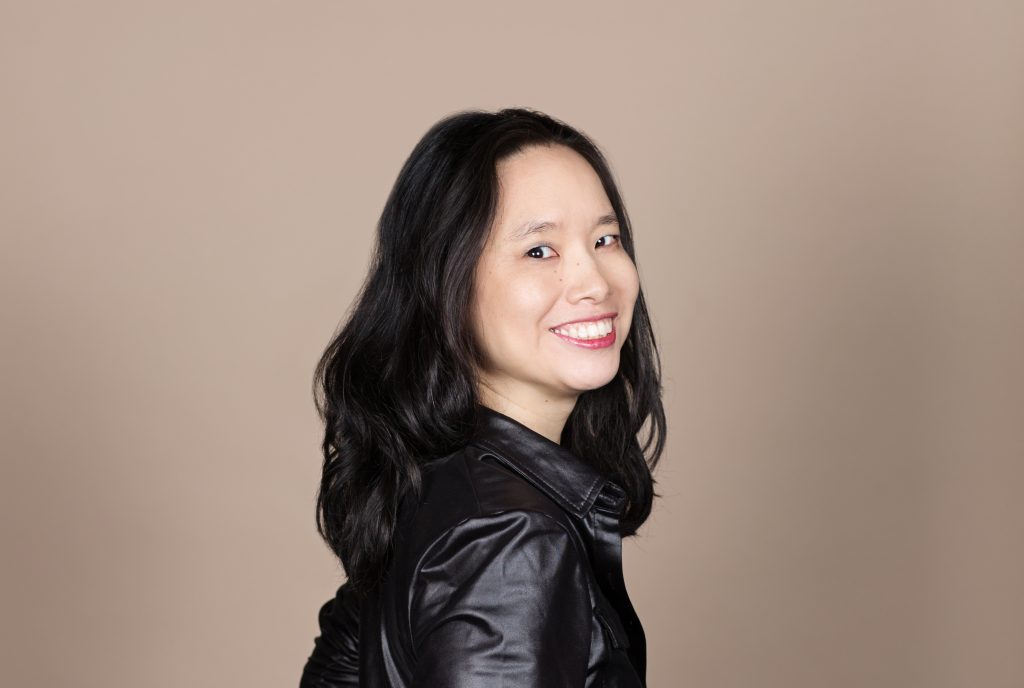HSO Musical Director Carolyn Kuan has stepped into the
spotlight, personally and professionally
By Cara Rosner
When Carolyn Kuan conducts an orchestra, it’s more than just a job to her. She doesn’t stand on her podium and merely move her arms, ensuring the musicians stay on tempo and play the piece properly. She uses her entire body, coaxing sounds from her musicians through movements – sometimes grand, sometimes barely detectable – that show she truly feels the music. Even her facial expressions convey the jubilation, gravitas, sadness, or tension the music conjures.
She’s heavily invested in the entire symphony orchestra experience. She doesn’t just want the music to sound good; she wants the audience involved, not merely as spectators and listeners but as part of the action. Conducting, which Kuan currently does as music director of the Hartford Symphony Orchestra (HSO), is one of her life’s true passions.
But as a young girl growing up in her native Taiwan, she never really imagined she’d one day become a conductor, let alone that she’d be leading one of this region’s largest symphony orchestras. She also never thought she’d be in a loving, committed relationship with a woman.
“I didn’t know I was queer at all. Being Asian, you don’t even realize the possibility. It’s not in the culture, it’s not on TV,” she says. “Most Asian countries are very traditional, so the idea that someone would be queer was not even in the realm of possibility.”
Kuan, who is 42, had her first girlfriend in college but didn’t fully come out as queer until much more recently. Her brother and father, for instance, didn’t know she is in a long-term relationship with a woman until about two years ago.
She grew up in Taipei, Taiwan, where her family still lives. In Asia, she says, the LGBTQ community, for the most part, is not highly visible or discussed. It didn’t occur to her she would potentially fall in love with women until she attended Smith College, a school recommended to her by a high school mentor. Kuan credits Smith with helping her realize she’s queer.

When her father came to visit her at college, she recalls, he assumed her then-girlfriend was merely a roommate.
“I didn’t tell my family for the longest time because I wasn’t sure how he [my father] would react,” she says. A couple of years ago, when Taiwanese leaders began discussing legalizing same-sex marriage (a move the nation ultimately made in May of this year, becoming the first Asian country to do so), she felt compelled to divulge the truth – particularly after seeing her brother post a message on Facebook denouncing same-sex unions.
“That’s when I decided, ‘I need to come out,’” she says. “So, I sent [my brother] a message on Facebook and said, ‘Here’s my page, here’s my girlfriend.’ And that’s how I decided to come out.” Her brother was supportive, but urged her not to tell their father.
That was two years ago. Soon after, Kuan began “dropping hints” to her father but “it was a long journey to telling him that people fall in love with whoever they fall in love with.” After six months, she came out to him, but she says he still didn’t fully acknowledge it. Then earlier this year, on a visit to Taiwan, she made it very clear to him.
“I think he’s ok with it,” she says. “I would have no problem bringing Elizabeth home [to Taiwan] with me. She’s the love of my life, and I’m proud of it. I’m a much better person since I met her.”
Kuan and her partner, who she wishes to identify only as Elizabeth, have been together for four years and live in Connecticut.
“I would say I’m fluid in terms of who I like. I believe people fall in love with whoever they like. I think sexuality is a spectrum,” says Kuan.

Falling in Love with Music
Kuan moved to the United States, alone, when she was a young teen – a decision that would shape the rest of her life.
“My middle school in Taiwan and my high school in America were sister schools, so [the high school] actively came to recruit students in Taiwan,” she says. The States made a quick impression on her during her first trip here in eighth grade, when she participated in a summer study program in Hartford.
“The very first day in class, the teacher said, ‘Feel free to ask questions’ – which, for most of you is perfectly normal,” she says. “It was an amazing moment for a young girl who was very rebellious naturally. Because in Taiwan, you don’t ask questions. You’re not encouraged to be creative.”
After returning home to Taiwan at the end of that summer, she applied to a U.S. high school, unbeknownst to her parents. She was accepted to Northfield Mount Hermon School, a boarding school in Massachusetts, and moved to America at age 14.
“It was there that I fell in love with music,” says Kuan.
Growing up, and even into adulthood, she figured she’d be an investment banker, or have some similar career. Her brother is a banker. But she double-majored in economics and music in college, and life took her on a different path.
“What drew me to conducting, more than anything, was it was the thing I understood the least,” she says. “Math came easy to me, computer science made sense to me. Conducting is a thing where, the more you learn, the more you have questions. I love the passion of it.”
After graduating cum laude from Smith, she earned a Master of Music degree at the University of Illinois and a Performance Diploma from the Peabody Conservatory. During college she also received a scholarship to attend a conductors’ institute at the University of Hartford’s Hartt School.
In the back of her mind, and what she kept telling her father, was the notion that she could always fall back on a banking career if she ultimately realized conducting and music weren’t for her. That didn’t happen.
Before coming to the HSO, she was the associate conductor of the Seattle Symphony Orchestra, artist-in-residence at the New York City Ballet, and assistant conductor for the Baltimore Opera Company. She was appointed music director of the HSO in 2011.
When Kuan came out as queer, she gave as much thought about how to tell her symphony family as she did her biological one.
“Symphony orchestra tends to be conservative, and I wasn’t sure how my symphony family would react,” she says, noting the HSO has been supportive. “Before I took her [Elizabeth] out to our first HSO gala, I reached out to some of our board members and told them ahead of time that I met this amazing girl and I think she’s the one I’m going to grow old with.”
Taking the Baton
As music director, Kuan is part of a team that oversees the HSO’s programs each year (“I have the ultimate say, for the most part.”) She also, in many ways, is the public face of the orchestra, attending local events and speaking to groups.
Under her leadership, the HSO has changed the way it approaches things.
“We think about our programs from the audience perspective,” Kuan says. An example is “Intermix,” an occasional program that invites audience members to move around the room and get up close and personal to musicians as they’re playing. In some cases, two ensembles in the same room will play two different pieces of music, and audience members can experience what that sounds likes from various vantage points.
“It completely changes how one experiences concerts,” she says proudly. “We encourage people to walk around so you can literally create your own experience. If you stand next to the harp, it’s going to sound very different than if you stand next to the cymbal.”
Intermix has taken place at a brewery, museums, cooperative work spaces, and other non-traditional venues.
“I love collaborating with partners, and they don’t always have to be traditional partners,” she says. Once, the orchestra played while an artist made a painting during the concert, inspired by the music. “We’re always thinking about out-of-the-box ideas, how to encourage people to think differently. Art is a way for us to speak, but also for us to think differently. Our music is a way for us to take a journey somewhere else.”
The orchestra, which can range from smaller groups to larger ones of about 100 musicians depending on what’s being performed, has largely been responsive to her unique ideas. The HSO is the second largest orchestra in New England, by budget, behind only the Boston Symphony Orchestra.
“For the most part, I’ve developed trust with our board, our musicians, our staff,” she says. “I’ve been grateful for people’s trust in me to take us on this new and different journey. Since I’ve become the music director, we’ve changed our relationship with the audience. I believe that arts organizations are there to serve their community, so that changes how you program, how you engage with the community, how you engage with your audience.”

Where Music and Life Intersect
Kuan also helps spearhead the HSO’s community outreach program, bringing musical experiences to the elderly, Hartford Public School students and others. But her reach extends beyond this region.
In June, she was the conductor for the New York City Opera’s world-premiere production of “Stonewall,” an opera that ran June 21-28 at the Lincoln Center for Performing Arts to commemorate the 50th anniversary of the police raid and riots at The Stonewall Inn in lower Manhattan. The opera, set in 1969, was the first to feature a transgender character specially written for a transgender singer, according to Playbill magazine.
“It’s one of the most amazing artistic experiences I’ve had,” says Kuan. “As a conductor, what drives me is feeling that I can make a difference. The entire cast, it felt like we were making a difference. The stories in ‘Stonewall,’ even though they happened 50 years ago, it feels like it could happen today. Especially in the world we live in right now – the attacks on minorities, the attacks on the LGBTQIA – I feel like we’re losing what little rights people have fought so hard for. [With the opera,] it felt like we were at least doing our part to share our story, and to encourage conversations. That was the point. People were laughing and crying throughout the show. As artists, that’s our job, to speak our truth and give voice to people who may not be able to be heard.”
Looking ahead, Kuan says her main goals are to feel fulfilled, both professionally and personally.
“I want to grow old with my partner; I want us to have a life together,” she says of Elizabeth, who is a communication and relationship coach specializing in working with LGBTQ individuals. “I want to be in environments, jobs, positions that give me the opportunity to make a difference. I want to find places where I can do things and champion ideas.”
And she’s as comfortable in her own skin as she is on stage.
“I’m very proud of telling people that I’m queer now,” she says. “Even though I just came out about two years ago, more than ever, I feel very strongly about telling people not only that I’m queer but that I am an immigrant and I’m proud of it. I believe diversity is important. We are an important part of society.”







More Stories
Make It Here, Just As You Are
Visiting the Abner Hotel
Queer Joy and Queer Resilience